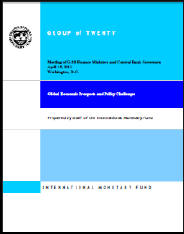Group of Twenty -- Meeting of G-20 Finance Ministers and Central Bank Governors
IMF Note on Global Economic Prospects and Policy Challenges
April 15, 2011, Washington, D.C.
About the Executive Summary
The Following executive summary is from a note by the Staff of the IMF prepared for the April 15, 2011 meeting of the Group of Twenty Finance Ministers and Central Bank Governors in Washington, D.C.
Read the Full text ![]()
Executive Summary
The recovery is gaining strength, but output gaps and unemployment remain high in advanced economies, while new macroeconomic risks are building in emerging economies.
- In G-20 advanced economies, the recovery is becoming more self-sustained. Growth will, however, remain too low to substantially reduce output gaps and still-high unemployment, reflecting the continuing impact of pre-crisis imbalances (e.g., housing) and crisis-related damage (e.g., financial systems and fiscal positions).
- In G-20 emerging economies, growth is expected to remain robust, in part reflecting limited damage from the crisis. However, inflationary pressures are building, and there are signs of overheating and nascent credit booms in a number of economies.
- All countries face a new challenge of higher commodity prices, which have increased due to strong demand and supply uncertainties. This is leading to higher headline inflation.
Financial risks have eased, but new risks have emerged.
- Slow growth and inadequate policy responses in advanced economies will keep fiscal positions
and financial systems vulnerable to shocks, especially in peripheral Europe, but also elsewhere.
- In some emerging economies, credit booms and overheating threaten eventual hard landings.
- Oil and food prices remain subject to supply uncertainty and upside price risks.
Key policy challenges are to strengthen growth in advanced economies, moderate growth in emerging economies, and reduce risks.
- In advanced economies, financial sector repair and reform, notably in the euro area, should proceed expeditiously. Articulation of clear and credible medium-term fiscal consolidation plans remains an urgent priority, particularly in the United States. Monetary policy should remain ccommodative—including to absorb the first-round inflation effects of higher commodity prices—but nimble to respond quickly if the risks of second-round effects rise.
- In emerging economies, the challenge is to avoid overheating in the face of closing output gaps and higher capital flows. The policy response should be twofold. First, to rely on a combination
of fiscal consolidation and higher interest rates to maintain output at potential. Second, to use macro-prudential tools, including, where appropriate, capital controls, to avoid increases in systemic risk stemming from inflows. The exchange rate appreciation that may result is part of the desirable adjustment, increases real income, and should not be resisted.
- The global macro policy agenda for the world remains the same, but with the passage of time, more urgent. For the recovery to be sustained, advanced countries must achieve fiscal consolidation. To do so and maintain growth, they need to rely more on external demand. Symmetrically, emerging economies must rely less on external demand and more on domestic demand. Appreciation of emerging economies' currencies relative to advanced economies' currencies is an important part of this adjustment.

